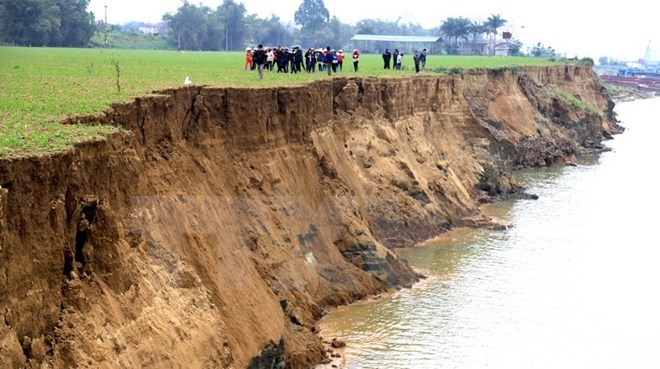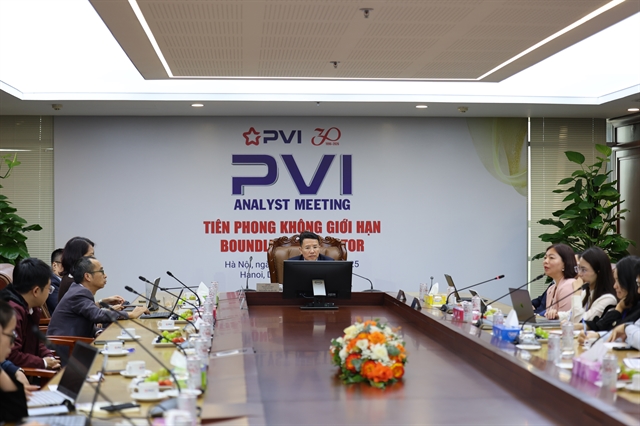 Environment
Environment

Sand mining activities of Thái Sơn Development & Investment JSC in northern Phú Thọ Province have alledgedly led to serious erosion and subsequent loss of farmland, leading to public concerns.
 |
| Erosion allegedly caused by illegal sand mining on the section of Lô River that passes through Tử Đà Commune, Phú Ninh District in the northern province of Phú Thọ. — VNA/VNS Photo |
PHÚ THỌ — Sand mining activities of a company in northern Phú Thọ Province have alledgedly led to serious erosion and subsequent loss of farmland, leading to public concerns, online newspaper VietnamPlus reported.
Last week, at Lô River’s section that passes through Tử Đà Commune of Phù Ninh District, three ships of Thái Sơn Development & Investment JSC could be seen approaching the bank to harvest sand, according to VietnamPlus.
At these mining sites, hundreds of metres of farmland of local farmers have been eroded.
Defiance of province’s order
According to an official regulation dating back to 2013, issued by the Standing Committee of the Provincial Party Committee, all sand mining activities at the section of Lô River that passes through Tử Đà Commune can only be conducted in the riverbed, while mining at other areas is forbidden.
According to Hà Kế Tài, vice chairman of Tử Đà Commune People’s Committee, all eroded land caused by mining is agricultural land allocated to households and individuals for agricultural production in the long term as per Decree 64/CP issued by the government.
Thái Sơn Co.’s operations have reached beyond designated areas in the riverbed, encroaching upon farmers’ agricultural land, which violates government’s policies and runs contravene to the province’s order.
The company, as per its commitment, is also expected to prevent unlicensed ships from other places entering the designated mining area; however, it has failed to perform this responsibility.
According to residents, the sand mining has been taking place since a few years. They said they had organised large crowds to protest and to drive the ships away but to no avail.
The locals had on several occasions also aired their complaints to the commune’s authorities regarding the loss of farmland, but local authorities claimed "their hands were tied."
Tài said the committee received local complaints in February and deployed two inspection groups to the site and caught three sand mining ships red-handed.
He said the commune had demanded that Thái Sơn Co. provide proper compensation for the loss of farmland caused by its mining operations and also put up boundary markers and buoys indicating its exploitation areas, in addition to fully observing the commitments to relevant administration agencies.
The commune authorities have also asked for instructions from the district’s higher-ups and notified Phù Ninh District’s police on the matter.
However, three months later the issue has still not been resolved. Thái Sơn Co. is continuing with its operations, causing further erosion and affecting 60 households, so far. The demands made by commune authorities regarding boundary markers have also not been observed.
"More dangerously, back in December 2016, locals discovered four improvised mines with seven detonators installed at the mining sites. Fortunately, the explosives were defused in time without incident," Tài added.
Since the beginning of 2017, the waterway police department of Phú Thọ Province has detected and handled 14 cases of illegal sand and gravel mining in riverways, "an increase from previous occasions despite enhanced inspections,” it said.
The provincial Department of Natural Resources and Environment has issued six new requirements for sand mining companies -- concrete posts to mark their mining areas; putting up sign posts with maps of their mining areas; putting up name and other relevant information of the companies on the ships; and registering mining vehicles with concerned agencies; as well as only carrying out mining from 6am to 6pm, mining at night is forbidden; and ships must not anchor anywhere near important points of the Lô River embankment. — VNS



.jpg)
